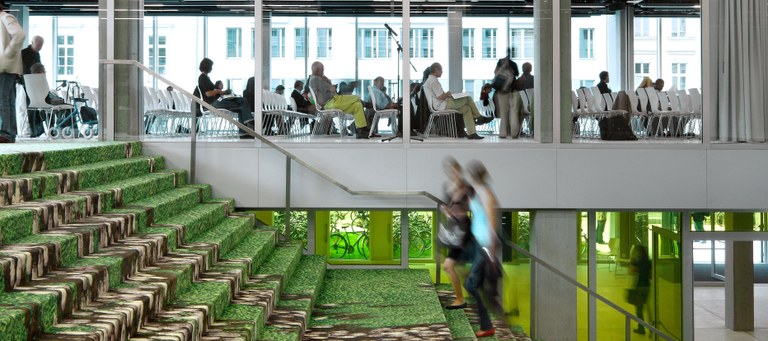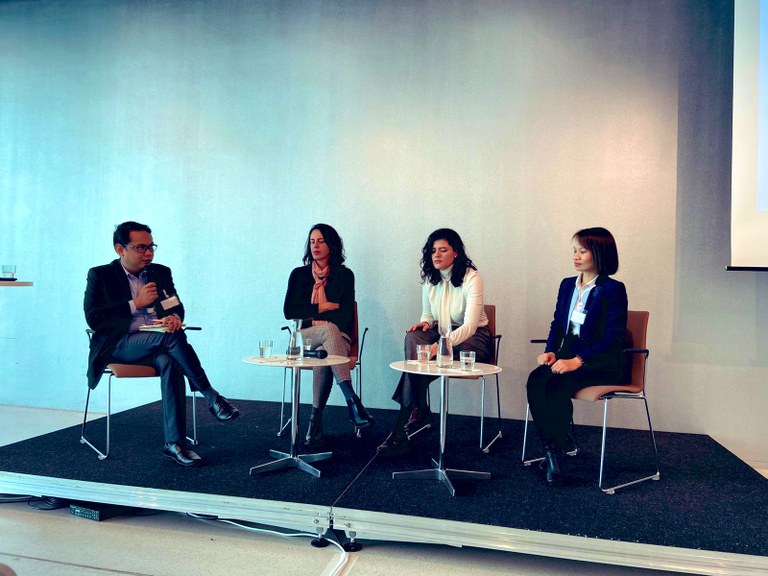Environmental Protection in Cities: Common Challenges and Innovative Solutions

The venue of the event, Heinrich-Böll-Stiftung’s Böll Haus. Image by Heinrich-Böll-Stiftung.
Welcomed into the event by Dr Harry Lehmann, of the German Federal Environment Agency, it was followed by the keynote by Prof. Manfred Fischedick, President of the Wuppertal Institute’s, who discussed the role that cities' participation has in contributing towards the New Urban Agenda. He stressed that technology, governance, culture and economy if addressed simultaneously within the framework of futures literacy could support this effort largely. Supporting this view, the keynote by Prof. Philipp Misselwitz, shared examples of the implementation of the New Urban Agenda and the SDGs in cities. His point being, that while interventions at the urban level might feel more realistic than the national level, we need to continue having exchanges like this conference to learn to face policy and legislation related to environmental protection, with more than just good intentions.
With the project focusing on urban development in six different countries; China, India, Russia, Brazil, South Africa, and Indonesia, the event was split into 2 sessions. The first session looked into the challenges to protect the urban environment and examples of innovative solutions used by the various contributors in the sectors of urban planning and land take, and mobility and air pollution. Challenges related to urban planning and land take had examples from the cities of Cabo Verde that is working towards creating a strategic plan with the UN-Habitat. Observations made by ICLEI in supporting sustainable projects in the cities of Seoul, Bologna and Nagpur were shared. Ending on an uplifting note of the growing awareness and citizen-led movements that demand better governance especially with regard to the air quality in the city of St. Petersburg. Mobility and air pollution were the other topics where the international experts presented experience to develop urban mobility sustainably in Moscow, Hanoi and Belo Horizonte.

The panel of international research collaborators for the session on mobility & air quality. Image by María Rosa Muñoz B. (@blungandida)
The second session that looked into the discussing governance of urban environmental protection which focused on what cities can do to support their national governments in mitigating climate change and vice versa. The session, answering the former began with inputs from Michael Leischner of the city of Dortmund. His team compiled a series of suggestions, one of the most relevant being, whether the national level was aware of, and disseminating learnings from, the accomplishments made by the various cities. Based on their experience with carrying out a series of projects, a city with a motivated leadership and a mobilised population relies very little on the national level. However, this need not be true only for cities like Dortmund, but also for economically less-attractive secondary cities, that are often left behind. The on-ground experience in Kisumu, the Kenyan port city, highlighted the untapped potential of such cities, that have far less vested political and commercial interests to pose a challenge for adventurous sustainable projects. More cities could reap the benefits of investments, support and motivation to pursue plans with the increased exchange of experience and moving beyond focusing on just their megacities.
The event ended with the closing words from Alice Shröder, from the Federal Environment Agency, the sponsor of the project, highlighting the relevance of the project for German policy, and looking forward to the results that are to be out by the end of the year.
--
For more information on the research project “Urban Environmental Protection in an International Context: Current State and Outlook” at the Wuppertal Institute, click here. and at the Umweltbundesamt (UBA), click here.
Image Sources:
Heinrich-Böll-Stiftung. (2020). Das Stiftungshaus in der Schumannstraße. Retrieved From: https://www.boell.de/de/das-stiftungshaus-der-schumannstrasse
María Rosa Muñoz B. [blungandida]. (2020, March 10). "Discussing about Mobility & Air Quality at the international conference “Environmental Protection in Cities: Common Challenges and Innovative Solutions”#WomenMobilize @Wupperinst @Umweltbundesamt”[Tweet].Retrieved from: https://twitter.com/blungandida/status/1237304625717526528

